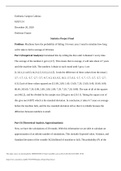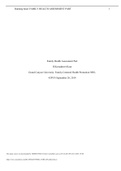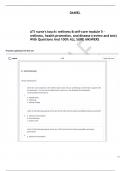Machinal - Study guides, Revision notes & Summaries
Looking for the best study guides, study notes and summaries about Machinal? On this page you'll find 38 study documents about Machinal.
Page 4 out of 38 results
Sort by
AC_DC Machines Final Exam Review Flashcards _ Quizlet (2).pdf

-
Statistics Project Final 1 .docx MAT-154 Statistics Project Final Problem: Machines have the probability of falling 1/6 every year. I need to simulate how long will it take to fail in average of 20 times. Part I (Empirical Analysis):I simulated thi
- Summary • 3 pages • 2021
-
- £4.38
- 31x sold
- + learn more
Statistics Project Final 1 .docx MAT-154 Statistics Project Final Problem: Machines have the probability of falling 1/6 every year. I need to simulate how long will it take to fail in average of 20 times. Part I (Empirical Analysis):I simulated this by rolling the dice until I obtained 1 every time. The average of the numbers I got is [4.7].This means that in average, it will take about 4.7 years until the machine fails. The numbers I obtain in each round until I got a 1 are [1,3,6,1,2,1,...

-
Summary Statistics Project Final 1 .docx MAT-154 Statistics Project Final Problem: Machines have the probability of falling 1/6 every year. I need to simulate how long will it take to fail in average of 20 times. Part I (Empirical Analysis):I simulated th
- Exam (elaborations) • 4 pages • 2022
-
- £3.18
- + learn more
Statistics Project Final Problem: Machines have the probability of falling 1/6 every year. I need to simulate how long will it take to fail in average of 20 times. Part I (Empirical Analysis):I simulated this by rolling the dice until I obtained 1 every time. The average of the numbers I got is [4.7]. This means that in average, it will take about 4.7 years until the machine fails. The numbers I obtain in each round until I got a 1 are [1,3,6,1,2,1,4,9,5,14,21,2,5,3,3,3,2,2,2,5]. I took th...

-
Summary Statistics Project Final 1 .docx MAT-154 Statistics Project Final Problem: Machines have the probability of falling 1/6 every year
- Exam (elaborations) • 3 pages • 2022
-
- £6.13
- + learn more
Problem: Machines have the probability of falling 1/6 every year. I need to simulate how long will it take to fail in average of 20 times. Part I (Empirical Analysis):I simulated this by rolling the dice until I obtained 1 every time. The average of the numbers I got is [4.7]. This means that in average, it will take about 4.7 years until the machine fails. The numbers I obtain in each round until I got a 1 are [1,3,6,1,2,1,4,9,5,14,21,2,5,3,3,3,2,2,2,5]. I took the difference of these valu...
NCLEX MACHINAL VENT QUESTION & ANSWERSNCLEX MACHINAL VENT QUESTION & ANSWERSNCLEX MACHINAL VENT QUESTION & ANSWERS
Detailed cheatsheet with all important notes for the final exam of the course Machine Learning. I passed the exam by only studying this cheatsheet.

-
Family Health Assessment Part II WEEK 3 NRS 429 edited
- Other • 5 pages • 2021
-
- £10.36
- + learn more
Family Health Assessment Part II Komalpreet Kaur Grand Canyon University: Family-Centered Health Promotion NRS-429VN September 20, 2019 Health starts in at home by eating well, staying active, and getting recommended health screening by a health care provider. Health is also determined by access to the social and economic conditions of individuals. Social determinants of health (SDOH) are conditions in the environments in which people are born, live, learn, work, play, worship, and ag...

-
NCLEX ARDS AND ARF AND CH 65 CRITICAL CARE , MACHINAL VENT ,FUNDAMENTALS OF NURSING, NCLEX PRACTICE ,RN HESI , CRITICALLY THINKING APRIL 20TH, RN QUESTIONS 2020, Study sessions, NCLEX RN®-MENTAL HEALTH & CRISIS INTERVENTION, NCLEX-RN®- Hemodynamics &
- Package deal • 11 items • 2021
-
- £63.39
- + learn more
NCLEX ARDS AND ARF AND CH 65 CRITICAL CARE , MACHINAL VENT ,FUNDAMENTALS OF NURSING, NCLEX PRACTICE ,RN HESI , CRITICALLY THINKING APRIL 20TH, RN QUESTIONS 2020, Study sessions, NCLEX RN®-MENTAL HEALTH & CRISIS INTERVENTION, NCLEX-RN®- Hemodynamics & Med Emergency, NCLEX 70 QUESTIONS WITH ANSWERS

£5.50 for your revision notes multiplied by 100 fellow students... Do the math: that's a lot of money! Don't be a thief of your own wallet and start uploading yours now. Discover all about earning on Stuvia





